| Windsor New South Wales | |||||||||||||||
|---|---|---|---|---|---|---|---|---|---|---|---|---|---|---|---|
 Historic Home in Windsor | |||||||||||||||
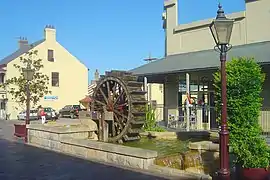 George Street Mall | |||||||||||||||
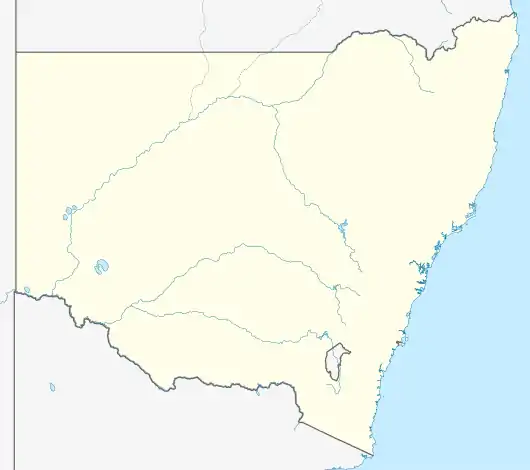 Windsor | |||||||||||||||
| Coordinates | 33°36′49″S 150°48′42″E / 33.61361°S 150.81167°E | ||||||||||||||
| Population | 1,891 (2016 census)[1] | ||||||||||||||
| Established | 1791 | ||||||||||||||
| Postcode(s) | 2756[2] | ||||||||||||||
| Elevation | 21 m (69 ft) | ||||||||||||||
| Location |
| ||||||||||||||
| LGA(s) | City of Hawkesbury | ||||||||||||||
| State electorate(s) | Hawkesbury | ||||||||||||||
| Federal division(s) | Macquarie | ||||||||||||||
| |||||||||||||||
Windsor is a historic town in north-west of Sydney, New South Wales, Australia. It is the council seat of the Hawkesbury local government area. The town sits on the Hawkesbury River, enveloped by farmland and Australian bush. Many of the oldest surviving European buildings in Australia are located at Windsor. It is 46 km (29 mi) north-west of the Sydney CBD, on the fringes of urban sprawl.
Demographics


At the 2016 census, Windsor had a reported population of 1,891 people, with a median age of 42. The most common ancestries in Windsor were English (30.9%), Australian (28.9%), Irish (10.3%), Scottish (7.5%), and German (2.8%). Most people from Windsor were born in Australia (78.8%), followed by England (3.3%), and New Zealand (1.5%).[1]
The most common religious group in Windsor was Christianity (65.8%), 25.2% being Catholic and 23.0% Anglican. The second largest group was No Religion (28.9%).[1]
The most common occupations in Windsor included Professionals (15.9%), Technicians and Trades Workers (15.1%), Clerical and Administrative Workers (13.6%), Managers (12.8%), and Labourers (11.0%). The median weekly household income was A$1,422.[1]
Geography
Windsor's proximity to the Hawkesbury River has resulted in numerous disastrous floods. A horseshoe on the outside wall of the Macquarie Arms pub marks the level the flood peaked at in 1867. During the 1867 flood, beaches along the Hawkesbury River to Barrenjoey were littered with the debris from the town.
History
The Windsor area was originally inhabited by the Dharuk (also Darug) nation of indigenous aboriginal peoples.
Windsor is the third-oldest place of British settlement on the Australian continent. Settlement at the location was first established circa 1791, near the head of navigation on the Hawkesbury River (known as Deerubbin in Dharuk). European settlers utilised the fertile river flats for agriculture. The area was originally called Green Hills, but renamed Windsor (after Windsor in England). The town was officially proclaimed in a Government and General Order issued from Government House, Sydney, dated 15 December 1810. Governor Lachlan Macquarie "marked out the district of Green Hills", which he "... called Windsor", after Windsor-on-the-Thames.
While in Windsor, Governor Macquarie ordered the main institutions of organised settlement to be erected, including a church, school-house, gaol and "commodious inn" (Macquarie Arms Hotel). Of these new buildings, the most outstanding was Francis Greenway's St Matthew's Anglican Church. Governor Macquarie himself chose the site for the church. Samuel Marsden, principal chaplain of the colony, consecrated the church on 8 December 1822.[3]
Windsor was chosen during settlement because of its agricultural potential and accessible location. In 1813 a report was given to Governor Macquarie from Earl Bathurst detailing a proposed invasion of the Hawkesbury River by France.[4] This planned invasion that did not eventuate targeted the Windsor granary in order to cut off supply to Sydney, demonstrating the relative importance of this new settlement on a global scale. Windsor is 56 km (35 mi) north-west of Sydney, and easily accessible by coastal shipping from Sydney along the Hawkesbury River. It was known as the "bread basket", ensuring the survival of the starving colony. The extensive agriculture caused major silting in the Hawkesbury River; by the 1890s the Hawkesbury River had become so blocked with silt, ships could not travel up to Windsor from the coast. By then, a railway (in 1864) and road (in 1814) had been built to compensate.
On 1 January 1803, Daniel Egan was born in Windsor. He went on to become Mayor of Sydney in 1853.
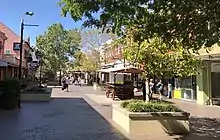
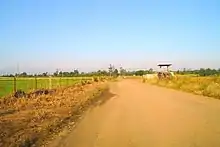
.jpg.webp)
Heritage listings
Windsor has a number of heritage-listed sites, including:
|
|
Media
The studios of local community radio station, Hawkesbury Radio, are located in Windsor.
Pitt Town, which is 9.3 km (5.8 mi) north west of Windsor, was a filming location for the Channel 7 television series A Country Practice. It was the set of the fictional town of Wandin Valley. The opening credits featured the former Court House Hotel, Windsor at 37-39 North Street as the doctor's clinic. Windsor High School at Mulgrave was also used as the fictional Burrigan High School in the series
Transport
Urban sprawl of metropolitan Sydney has almost reached Windsor. The town is now regarded as an outer suburb which has retained its appeal as a small country town. Growth in the Hawkesbury area has created an increased need for public transport and roads. Most people from Windsor traveled to work by car in 2016 (68.9%).[1] Only 9.0% of people used public transport.[1]
Windsor railway station opened 1 December 1864.[29] It is on the Richmond branch.
Located in the town centre is the Windsor Bridge which was constructed in 1874. It is the oldest existing crossing of the Hawkesbury River.[30] There was a proposal in 2013 by the Government of New South Wales to demolish the existing bridge and replace it with a safer bridge. It was suggested by the political activist group Community Action for Windsor Bridge (CAWB) that a bypass is a better option to preserve history, ensure safety, and better manage the congestion of Windsor Road.[31] Nevertheless, the new bridge was constructed despite the protests. On 18 May 2020 the replacement bridge was opened to traffic within Windsor, NSW.[32]
The new bridge has a centreline height of 17.8 metres Australian Height Datum (AHD) (ie significantly higher than the typical water level – peak flood levels at Windsor bridge are 11.1 metres AHD and 17.2 metres AHD for the five year and 100 year ARI events respectively.[33]). In 2021 the bridge was closed due to flooding in March 2021,[34] and further work on the new bridge was completed[35]
Windsor is also connected to Parramatta via the 31-kilometre-long (19 mi) Windsor Road cycleway, with much of its route via the North-West T-way.[36]
Commercial area
The Windsor Mall Sunday Market are held weekly on Sunday between 9.00am to 3.00pm. The markets contain stalls selling jewellery, books, arts and crafts, paintings, fashion items, fresh locally grown produce, locally produced jams and many food and drink stands.
Gallery
 Historic Home in Windsor
Historic Home in Windsor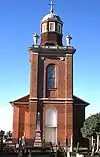 St Matthew's Anglican Church, designed by Francis Greenway
St Matthew's Anglican Church, designed by Francis Greenway Interior of St Matthew's Church
Interior of St Matthew's Church Hawkesbury River at Windsor
Hawkesbury River at Windsor.jpg.webp) Poster Contest (Royal Australian Historical Society)
Poster Contest (Royal Australian Historical Society)
Bibliography
- Bowd, D. G. Macquarie Country: A History of the Hawkesbury. Library of Australian History, 1994.
- CAWB. ‘Windsor Bridge.’ http://www.cawb.com.au/the-place.html
- Fitzpatrick, J.C.L. When We Were Boys Together: reminiscences of the Hawkesbury district. C. McHardy, c2004.
- Jack, Ian, and Jan Barkley-Jack. St Matthews Windsor - An Anglican Landmark celebrating 200 years. Rosenberg Publishing, 2016.
- Proudfoot, Helen. The Hawkesbury: A Thematic History. Hawkesbury City Council, 2017. https://www.hawkesbury.nsw.gov.au/__data/assets/pdf_file/0004/119911/The-Hawkesbury-A-Thematic-History-2017-February.pdf
- Smith, Heather. Leaving The Barracks - Windsor Police Station, 1862 – 2010. H. Smith, 2011.
- Steele, James. Early Days of Windsor. https://gutenberg.net.au/ebooks13/1302241h.html
See also
References
- 1 2 3 4 5 6 Australian Bureau of Statistics (27 June 2017). "Windsor (State Suburb)". 2016 Census QuickStats. Retrieved 14 October 2018.
- ↑ Windsor Postcode Archived 14 February 2022 at the Wayback Machine Australia Post
- ↑ Baker, Helen (1967). Historic Buildings. Windsor and Richmond (1st ed.). The State Planning Authority of New South Wales.
- ↑ "Reports of a possible French invasion off the Hawksbury". Hawkesbury Historical Society. Archived from the original on 19 March 2012. Retrieved 18 December 2016.
- ↑ "Windsor Railway Station Group and Former Goods Yard". New South Wales State Heritage Register. Department of Planning & Environment. H01287. Retrieved 18 May 2018.
 Text is licensed by State of New South Wales (Department of Planning and Environment) under CC-BY 4.0 licence.
Text is licensed by State of New South Wales (Department of Planning and Environment) under CC-BY 4.0 licence. - ↑ "Stables at rear of Police Station". New South Wales State Heritage Register. Department of Planning & Environment. H01018. Retrieved 18 May 2018.
 Text is licensed by State of New South Wales (Department of Planning and Environment) under CC-BY 4.0 licence.
Text is licensed by State of New South Wales (Department of Planning and Environment) under CC-BY 4.0 licence. - ↑ "Claremont Cottage". New South Wales State Heritage Register. Department of Planning & Environment. H00738. Retrieved 18 May 2018.
 Text is licensed by State of New South Wales (Department of Planning and Environment) under CC-BY 4.0 licence.
Text is licensed by State of New South Wales (Department of Planning and Environment) under CC-BY 4.0 licence. - ↑ "Windsor Court House". New South Wales State Heritage Register. Department of Planning & Environment. H00804. Retrieved 18 May 2018.
 Text is licensed by State of New South Wales (Department of Planning and Environment) under CC-BY 4.0 licence.
Text is licensed by State of New South Wales (Department of Planning and Environment) under CC-BY 4.0 licence. - ↑ "Mackenzie House". New South Wales State Heritage Register. Department of Planning & Environment. H00735. Retrieved 18 May 2018.
 Text is licensed by State of New South Wales (Department of Planning and Environment) under CC-BY 4.0 licence.
Text is licensed by State of New South Wales (Department of Planning and Environment) under CC-BY 4.0 licence. - ↑ "Government Cottage Archaeological Site". New South Wales State Heritage Register. Department of Planning & Environment. H01843. Retrieved 18 May 2018.
 Text is licensed by State of New South Wales (Department of Planning and Environment) under CC-BY 4.0 licence.
Text is licensed by State of New South Wales (Department of Planning and Environment) under CC-BY 4.0 licence. - ↑ "Loder House". New South Wales State Heritage Register. Department of Planning & Environment. H00003. Retrieved 18 May 2018.
 Text is licensed by State of New South Wales (Department of Planning and Environment) under CC-BY 4.0 licence.
Text is licensed by State of New South Wales (Department of Planning and Environment) under CC-BY 4.0 licence. - ↑ "Simmons Hardware Store". New South Wales State Heritage Register. Department of Planning & Environment. H00667. Retrieved 18 May 2018.
 Text is licensed by State of New South Wales (Department of Planning and Environment) under CC-BY 4.0 licence.
Text is licensed by State of New South Wales (Department of Planning and Environment) under CC-BY 4.0 licence. - ↑ "Rev. Peter Turner Cottage and Well". New South Wales State Heritage Register. Department of Planning & Environment. H00202. Retrieved 18 May 2018.
 Text is licensed by State of New South Wales (Department of Planning and Environment) under CC-BY 4.0 licence.
Text is licensed by State of New South Wales (Department of Planning and Environment) under CC-BY 4.0 licence. - ↑ "McQuade Park". New South Wales State Heritage Register. Department of Planning & Environment. H01851. Retrieved 18 May 2018.
 Text is licensed by State of New South Wales (Department of Planning and Environment) under CC-BY 4.0 licence.
Text is licensed by State of New South Wales (Department of Planning and Environment) under CC-BY 4.0 licence. - ↑ "Terrace Building". New South Wales State Heritage Register. Department of Planning & Environment. H00075. Retrieved 18 May 2018.
 Text is licensed by State of New South Wales (Department of Planning and Environment) under CC-BY 4.0 licence.
Text is licensed by State of New South Wales (Department of Planning and Environment) under CC-BY 4.0 licence. - ↑ "Uniting Church and Hall". New South Wales State Heritage Register. Department of Planning & Environment. H00735. Retrieved 18 May 2018.
 Text is licensed by State of New South Wales (Department of Planning and Environment) under CC-BY 4.0 licence.
Text is licensed by State of New South Wales (Department of Planning and Environment) under CC-BY 4.0 licence. - ↑ "Methodist Parsonage (former)". New South Wales State Heritage Register. Department of Planning & Environment. H00735. Retrieved 18 May 2018.
 Text is licensed by State of New South Wales (Department of Planning and Environment) under CC-BY 4.0 licence.
Text is licensed by State of New South Wales (Department of Planning and Environment) under CC-BY 4.0 licence. - ↑ "St. Matthew's Anglican Church, Rectory, Stables & Cemetery". New South Wales State Heritage Register. Department of Planning & Environment. H00015. Retrieved 18 May 2018.
 Text is licensed by State of New South Wales (Department of Planning and Environment) under CC-BY 4.0 licence.
Text is licensed by State of New South Wales (Department of Planning and Environment) under CC-BY 4.0 licence. - ↑ "House". New South Wales State Heritage Register. Department of Planning & Environment. H00150. Retrieved 18 May 2018.
 Text is licensed by State of New South Wales (Department of Planning and Environment) under CC-BY 4.0 licence.
Text is licensed by State of New South Wales (Department of Planning and Environment) under CC-BY 4.0 licence. - ↑ "House". New South Wales State Heritage Register. Department of Planning & Environment. H00108. Retrieved 18 May 2018.
 Text is licensed by State of New South Wales (Department of Planning and Environment) under CC-BY 4.0 licence.
Text is licensed by State of New South Wales (Department of Planning and Environment) under CC-BY 4.0 licence. - ↑ "Cottage". New South Wales State Heritage Register. Department of Planning & Environment. H00107. Retrieved 18 May 2018.
 Text is licensed by State of New South Wales (Department of Planning and Environment) under CC-BY 4.0 licence.
Text is licensed by State of New South Wales (Department of Planning and Environment) under CC-BY 4.0 licence. - ↑ "House". New South Wales State Heritage Register. Department of Planning & Environment. H00142. Retrieved 18 May 2018.
 Text is licensed by State of New South Wales (Department of Planning and Environment) under CC-BY 4.0 licence.
Text is licensed by State of New South Wales (Department of Planning and Environment) under CC-BY 4.0 licence. - ↑ "House". New South Wales State Heritage Register. Department of Planning & Environment. H00109. Retrieved 18 May 2018.
 Text is licensed by State of New South Wales (Department of Planning and Environment) under CC-BY 4.0 licence.
Text is licensed by State of New South Wales (Department of Planning and Environment) under CC-BY 4.0 licence. - ↑ "Houses". New South Wales State Heritage Register. Department of Planning & Environment. H00110. Retrieved 18 May 2018.
 Text is licensed by State of New South Wales (Department of Planning and Environment) under CC-BY 4.0 licence.
Text is licensed by State of New South Wales (Department of Planning and Environment) under CC-BY 4.0 licence. - ↑ "Peninsula House, Tebbutt's Observatory". New South Wales State Heritage Register. Department of Planning & Environment. H00028. Retrieved 18 May 2018.
 Text is licensed by State of New South Wales (Department of Planning and Environment) under CC-BY 4.0 licence.
Text is licensed by State of New South Wales (Department of Planning and Environment) under CC-BY 4.0 licence. - ↑ "Macquarie Arms Hotel". New South Wales State Heritage Register. Department of Planning & Environment. H00041. Retrieved 18 May 2018.
 Text is licensed by State of New South Wales (Department of Planning and Environment) under CC-BY 4.0 licence.
Text is licensed by State of New South Wales (Department of Planning and Environment) under CC-BY 4.0 licence. - ↑ "Thompson Square Conservation Area". New South Wales State Heritage Register. Department of Planning & Environment. H00126. Retrieved 18 May 2018.
 Text is licensed by State of New South Wales (Department of Planning and Environment) under CC-BY 4.0 licence.
Text is licensed by State of New South Wales (Department of Planning and Environment) under CC-BY 4.0 licence. - ↑ "House & Outbuildings". New South Wales State Heritage Register. Department of Planning & Environment. H00005. Retrieved 18 May 2018.
 Text is licensed by State of New South Wales (Department of Planning and Environment) under CC-BY 4.0 licence.
Text is licensed by State of New South Wales (Department of Planning and Environment) under CC-BY 4.0 licence. - ↑ Station Names. Date of opening, closing and/or change of name. Public Transport Commission of New South Wales. Administrative Branch (Archives Section) (3rd ed.). February 1979 [1965]. p. 37.
{{cite book}}: CS1 maint: others (link) - ↑ Liz Foschia (4 December 2013). "NSW Premier's office accused of political interference in Windsor Bridge approval". ABC News. Australia. Archived from the original on 31 October 2016. Retrieved 15 January 2015.
- ↑ CAWB. "An Alternative – CAWB". Community Action for Windsor Bridge. Archived from the original on 20 December 2016. Retrieved 6 December 2016.
- ↑ Windsor Bridge replacement Archived 18 April 2020 at the Wayback Machine Transport for NSW
- ↑ "Windsor Bridge EIS - Chapter 7.7 - Hydrology" (PDF). Roads-waterwasys.transport.nsw.gov.au. November 2012. Archived (PDF) from the original on 8 March 2022. Retrieved 1 February 2022.
- ↑ "The New Windsor Bridge has re-opened after flooding forced its closure". Facebook.com. Archived from the original on 1 February 2022. Retrieved 1 February 2022.
- ↑ "Windsor Bridge replacement". Roads-waterways.transport.nsw.gov.au. 30 January 2023. Archived from the original on 24 November 2021. Retrieved 24 November 2021.
- ↑ 83 Macquarie St, Parramatta NSW 2150 to 98 Macquarie St, Windsor NSW 2756 (Map). Google Maps. Retrieved 18 December 2016.